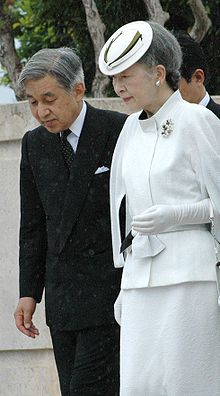 Empress Michiko (right), and her husband Emperor Akihito | |
| Gender | Female |
|---|---|
| Language(s) | Japanese |
| Origin | |
| Meaning | Different meanings depending on the kanji used |
| Region of origin | Japan |
| Other names | |
| Related names | Michiyo Michiru Machiko Michie Michi Michirō Michio Michihiko Michiya |
Michiko is a Japanese given name, used for females. Although written romanized the same way, the Japanese language written forms (kanji, katakana, hiragana) can be different. Common forms include:
- 美智子 — "beautiful wise child"
- 美千子 — "child of a thousand beauties"
- 見知子 — "child of recognition"
- 道子 — "child of the way"
- 路子 — "child of the road"
- 倫子 — "child of morals"
- 皆子 — "child of all"
- 通子 — "child of passage"
Phonetic spellings (no particular meaning):